

The Beginning Of A New Economy - Sustainable Human. Ecobasa.org launched! Written by Arne Bollinger on July 16, 2015, 12:31 p.m.
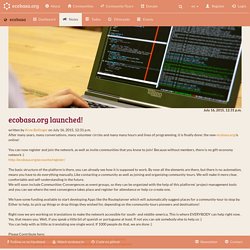
After many years, many conversations, many volunteer circles and many many hours and lines of programming, it is finally done: the new ecobasa.org is online! You can now register and join the network, as well as invite communities that you know to join! Because without members, there is no gift-economy network :) The basic structure of the platform is there, you can already see how it is supposed to work. By now all the elements are there, but there is no automation, means you have to do everything manually. We have some funding available to start developing Apps like the Routeplanner which will automatically suggest places for a community-tour to stop by.
Right now we are working on translations to make the network accessible for south- and middle-america. Dans cette pizzeria, vous pouvez payer avec un post-it. Le projet génial d'un ancien de Wall Street. Quand un ancien employé de Wall Street décide de changer de vie pour être en accord avec ses valeurs… cela peut donner quelque chose de vraiment surprenant !

Marie Goodwin on How to Run a Business in the Gift Economy. Reposted from Shareable magazine, Marie Goodwin talks about the challenges and rewards of exploring the gift economy.
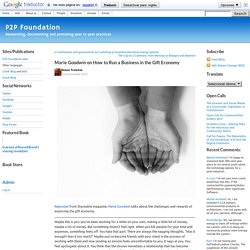
Maybe this is you: you’ve been working for a while on your own, making a little bit of money, maybe a lot of money. But something doesn’t feel right. When you bill people for your time and expenses, something feels off. You hate that part. There are always the nagging thoughts, “Was it enough? Or, maybe you are thinking about starting a small business on the side: selling kimchi or pickles or vanilla elixirs at the holiday market in town this year. Gift economics can help solve these nagging feelings that linger around the corners of for-profit businesses.
In this way, people get their needs for food, water, shelter, clothing, and luxuries met. More and more people are turning to doing business “in the gift” as a way to help them feel more authentic in their business relationships and bridge the friend/client divide. Creating a culture of trust and support. A gift-economy experience. Demander inconditionnellement.
L’expérience m’a appris que quand une personne entre dans l’économie du don, la plupart des gens pensent que cette personne devrait demander uniquement ce qui sert ses besoins basiques de survie. Au-delà de cette ligne, on entre dans le futile ou le trop demander. The Gift Economy - Web Design. Comment l’économie du partage crée du lien social. Alors que les échanges marchands créent de plus en plus d'exclusion sociale et de défiance, l'économie du partage, par le don, transforme les relations grâce à la reconnaissance et l'inter-dépendance.
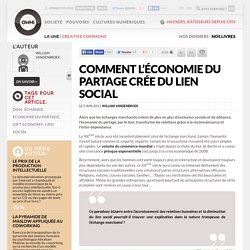
Le XXème siècle aura été incontestablement celui de l’échange marchand. Main Page - GiftEconomy. Sacred Economics with Charles Eisenstein - A Short Film. Genuine Gifting Circles vs. the Monetization of the Gift: a warning on the Women’s Gifting Circles pyramid scheme. Do you really want to step into abundance and gift?
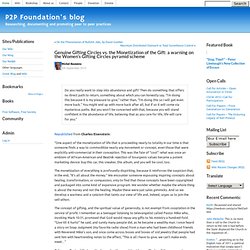
Then do something that offers no direct path to return, something about which you can honestly say, “I’m doing this because it is my pleasure to give,” rather than, “I’m doing this so I will get even more back.” You might end up with more back after all, but if so it will come via mysterious paths. But you won’t be concerned with that, because you will stand confident in the abundance of life, believing that as you care for life, life will care for you.” Republished from Charles Eisenstein: “One aspect of the monetization of life that is proceeding nearly to totality in our time is that someone finds a way to commoditize nearly any movement or concept, even those that were explicitly anti-commercial in their conception. The monetization of everything is profoundly dispiriting, because it reinforces the suspicion that, in the end, “It’s all about the money.”
Related motives might include: * A desire for approval or solicitude from others. Gift economy - web brain. Gift economy - On the Spiral. Defining Abundance in the Context of a Gift Economy. Examining Gift Economies. I recently discovered Eric S.

Raymond’s insightful examination of hacker culture Homesteading the Noosphere and found many parallels between the issues I have been writing about (particularly here and here) and ESR’s characterization of hackers as participants in a gift economy. Per wikipedia: In the social sciences, a gift economy (or gift culture) is a society where valuable goods and servicesare regularly given without any explicit agreement for immediate or future rewards (i.e. no formal quid pro quo exists).[1] Ideally, simultaneous or recurring giving serves to circulate and redistribute valuables within the community.
Why the Gift Economy Will Grow Unnoticed. I am finding myself increasingly surprised and dismayed at proponents of alternative currency who propose and promote systems that fundamentally offer very little change from our current system.
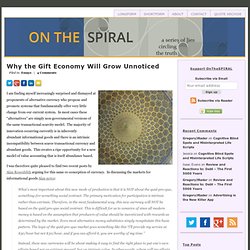
In most cases these “alternatives” are simply non-governmental versions of the same transactional-scarcity model. The majority of innovation occurring currently is in inherently abundant informational goods and there is an intrinsic incompatibility between scarce transactional currency and abundant goods. Chaîne de CharlesEisenstein.
To Build Community, an Economy of Gifts by Charles Eisenstein. For a multitude of reasons, we need to need each other. posted Dec 27, 2011 Wherever I go and ask people what is missing from their lives, the most common answer (if they are not impoverished or seriously ill) is "community.
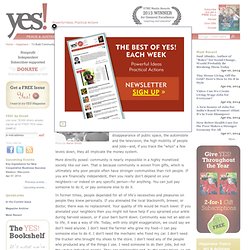
" What happened to community, and why don't we have it any more? There are many reasons—the layout of suburbia, the disappearance of public space, the automobile and the television, the high mobility of people and jobs—and, if you trace the "whys" a few levels down, they all implicate the money system. More directly posed: community is nearly impossible in a highly monetized society like our own.
In former times, people depended for all of life's necessities and pleasures on people they knew personally.